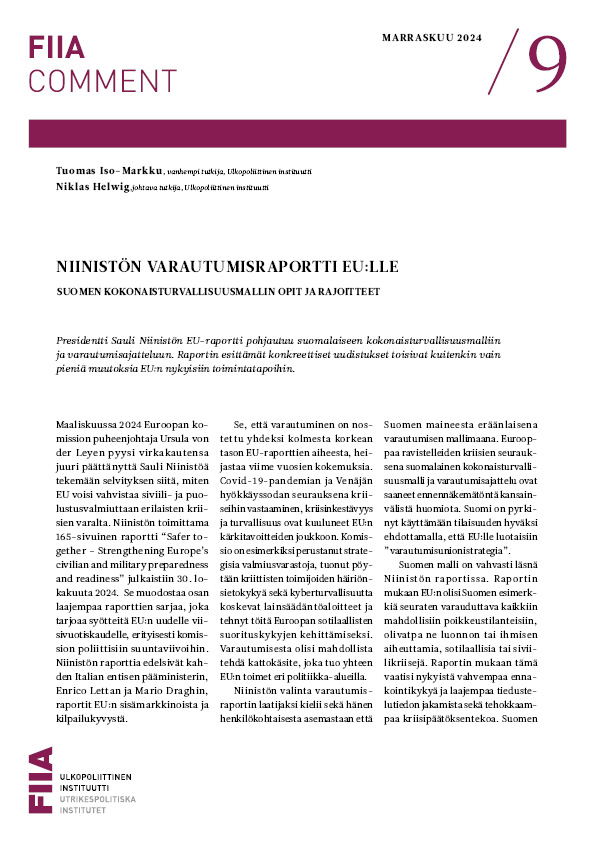Angela Merkel is known for her ability to forge EU deals and demobilize the opposition at home. Now, however, the migration crisis is limiting her possibilities to reconcile different views in Europe, Germany and her own coalition – edging her chancellorship to the brink.
Angela Merkel is known for her ability to forge EU deals and demobilize the opposition at home. Now, however, the migration crisis is limiting her possibilities to reconcile different views in Europe, Germany and her own coalition – edging her chancellorship to the brink.
Earlier this year, Angela Merkel endured one of the most difficult weeks of her chancellorship. In three state elections on 13 March conservative voters rejected her open border policy. At the same time, the humanitarian situation of refugees along the Western Balkan route worsened and a deal had to be made with the inconvenient partner Turkey at a showdown European summit on 18 March. Merkel had miscalculated. Her genuine belief in a European solution to the migration crisis had proved to be misguided in the face of populist pressure in EU partner countries. Even worse, many German voters had run out of patience.
Merkel dodged the bullet in these difficult weeks. Undoubtedly, her Christian Democratic Union (CDU) lost voters to the populist right-wing party, Alternative für Deutschland (AfD). For example, a third of AfD votes in Baden-Wuerttemberg, one of the most populous German states, were cast by previous CDU voters. On the left flank, voters in support of her migration policy opted to vote for the Greens or the Social Democrats (SPD).
The message for Merkel was mixed. On the one hand, the high number of refugees clearly troubled a large part of her party base. On the other hand, by caving in to pressure from the right, she would have lost credibility and the support of a large part of civil society that embraced the “Willkommenskultur” of Germany.
Temporary relief came from the European level, albeit not in the form that Merkel had anticipated. After Austria closed its borders to refugees and the Turkey deal entered into force, the number of refugees arriving in Germany via the Balkan route dropped sharply. Only 20,000 people arrived in March 2016. Some months earlier, the number had been ten times as high. The headlines in European newspapers that hyped the “refugee wave” disappeared, paving the way for a more constructive dialogue on long-term solutions to the migration challenge.
Unfortunately, progress in updating the common asylum policy at the European level has been sluggish. The Commission proposed an automatic corrective allocation mechanism on 5 May, which would provide automatic relief to Greece and Italy. Yet the scheme faces strong opposition from Central European states. In the meantime, the controversial deal with Turkey is showing the first – and largely anticipated – cracks. The European Parliament is delaying visa liberalization for Turkish citizens and Turkish President Recep Tayyip Erdoğan is threatening to send migrants back to Greece.
If the Turkey deal fails and refugee numbers climb, Merkel will face strong pressure at home. She has already made a quiet U-turn on her open migration policy by shutting the EU borders towards Turkey and by gradually introducing stricter asylum rules.
High refugee numbers in Greece or Italy would once again put Merkel in a difficult situation. She could offer German refuge to a large number of asylum seekers, thereby arousing the anger of EU partners that believe her policy causes a “pull effect”, and of the conservative right in Germany. Alternatively, she could watch the drama in the south unfold and face strong criticism from a majority in Germany that is still open to immigration.
The election calendar at home gives Merkel some – but not much – time to breathe. The major tests before the federal election in autumn 2017 will be the state elections next spring in Saarland, Schleswig-Holstein and Germany’s most populous state, North Rhine-Westphalia.
Voters will be judging the government particularly on its performance in integrating the estimated 800,000 refugees that have remained in Germany. The government is due to agree on a new draft legislation package including sticks and carrots for migrants to ensure participation in integration measures by the end of May.
A forceful return of the migration crisis to the German public discussion could prove toxic for Merkel’s own party and the government coalition. Horst Seehofer, the Minister-President of Bavaria from Merkel’s conservative sister party in the state, has been attacking Merkel from the conservative wing of the coalition, but has so far stopped short of openly questioning her chancellorship. While he withdrew his threat to sue the federal government over its refugee policy, he will not hesitate to retaliate if asylum numbers climb again.
On the left, the SPD is desperately looking for an opening to boost its profile before the election season. Scoring only 20 per cent in the polls – a mere five percentage points ahead of the AfD – the SPD chief, Sigmar Gabriel, started to attack Merkel on the downsides of the Turkey deal and her weak reaction to the worsening situation in Greece. Luckily for her, no credible challenger is in sight within her own party or the SPD.
The migration crisis is fuelling the populist challenge. The AfD is winning by attacking the immigration policy of established parties. Without the hot migration topic, the AfD’s appeal would depend on the ability of its leadership to unite the party and produce serious policies and results in their parliamentary work. Divisions run deep between the more moderate Eurosceptics and members that harbour outright xenophobic or racist views. The party programme features ultraconservative views on social and family policies. It is strictly anti-Islam. The AfD’s far-right policies have the potential to alienate most parts of the German electorate, as long as the migration crisis does not hijack the political discussion.
The moderate Greens are also profiting from the crisis and are seen as credible on immigration and integration policies. Riding high in the polls, the Greens could be the ‘white knight’ that secures Merkel’s fourth term next year in the event of a weak SPD result, or as a fourth coalition partner. Nevertheless, and worryingly for those who have praised Merkel’s leadership in Europe in the past, she is less and less in control of the fate of her chancellorship as the options for consensus at home and in the EU diminish.








